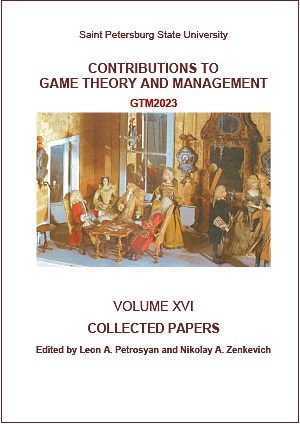Coordinating Buyback Contract in Supply Chains with Limited Funding
Abstract
The paper considers the problem of supply chain profit maximization with the buyback contract. The solution is given for a two-echelon supply chain where a retailer is faced with limited funding and chooses between bank financing and trade credit provided by a supplier. It is shown that the buyback contract does not coordinate the considered supply chain as the supplier's profit in this case does not achieve its maximum. Therefore conditional coordination of the supply chain with limited funding is considered. It identifies the situation where the retailer's and the supply chain's profits are maximized while the supplier's profit is greater than that earned with the wholesale-price contract. It is proved that the examined supply chain achieves conditional coordination both with bank loan and trade credit, and trade credit is preferred to bank financing as the supply chain's individual and total profits are higher than those earned with bank loan. Based on the model solution an algorithm for selecting the parameters of conditionally coordinating buyback contract with limited funding is proposed.
Keywords:
supply chain, coordination, buyback, contract, limited funding, supplier financing, trade credit
Downloads
References
Arshinder, A. K., S. G. Deshmukh (2008). Supply chain coordination:perspectives, empirical studies and research directions. International Journal of Production Economics, 115(2), 316–335.
Babich, V., H. Li, P. Ritchken, Y. Wang (2012). Contracting with asymmetric demand information in supply chains. European Journal of Operational Research, 217(2), 333–341.
Berezinets, I., M. Meshkova, N. Nikolchenko (2019). The problem of supply chain profit maximization using sales rebate contract. Contributions to Game Theory and Management, 12, 70–99.
Berezinets, I., T. Voronova, N. Zenkevich, N. Nikolchenko (2022). Coordinating contracts as an instrument of supply chain profit maximization under short-term financing necessity. Contributions to Game Theory and Management, 13, 57–94.
Berezinets, I., N. Zenkevich, A. Rucheva, N. Nikolchenko (2020). Do the buyback contracts of undistributed stocks coordinate the supply chain? (in Russian). Vestnik of Saint Petersburg University. Management, 19(4), 461–492.
Bose, I., P. Anand (2007). On returns policies with exogenous price. European Journal of Operational Research, 178(3), 782–788.
Cachon, G. P., M. Lariviere (2005). Supply chain coordination with revenue-sharing contracts: strengths and limitations. Management Science, 51, 30–44.
Cachon, G. P. (2003). Supply chain coordination with contracts. In: Supply chain Management: Design, Coordination and Operation, (Graves, S. T. de Kok, eds.), 11, pp. 227–339.
Chen, X. (2015). A Model of trade credit in a capital-constrained distribution channel. International Journal of Production Economics, 159, 347–357.
Fu, Y., F. Liu (2019). The problem of a capital-constrained supply chain with a risk-averse retailer. In: 2019 8th International Conference on Industrial Technology and Management (ICITM), pp. 1–6. Cambridge, United Kingdom.
Giannoccaro, I. (2018). Centralized vs. decentralized supply chains: the importance of decision maker's cognitive ability and resistance to change. Industrial Marketing Management, 73, 59–69.
Granot, D., S. Yin (2005). On the effectiveness of returns policies in the price dependent newsvendor model. Naval Research Logistics, 52(8), 765–778.
Heydari, J., T. M. Choi, S. Radkhah (2017). Pareto improving supply chain coordination under a money-back guarantee service program. Service Science, 9(2), 91–105.
Kagan, J. (2022, 17 July). Trade Credit. Investopedia. Available from: https://www.investopedia.com/terms/t/trade-credit.asp
Kouvelis, P., W. Zhao (2012). Financing the newsvendor: supplier vs. bank, and the structure of optimal trade
contracts. Operations Research, 60(3), 566–580.
Kouvelis P., W. Zhao (2015). Supply chain contract design under financial constraints and bankruptcy costs. Management Science, 62(8), 2341–2357.
Lee, H. L., V. Padmanabhan, S. Whang (1997). The bullwhip effect in supply chains. MIT Sloan Management Review, 38(3), 92–102.
Moon I., X.-H. Feng, K.-Y. Ryu (2015). Channel coordination for multi-stage supply chains with revenue-sharing contracts under budget constraints. International Journal of Production Research, 53(16), 4819–4836.
Pasternack, B. A. (1985). Optimal pricing and return policies for perishable commodities. Marketing Science, 4(2), 166–176.
Saha, S. (2013). Supply chain coordination through rebate induced contracts. Transportation Research Part E: Logistics and Transportation Review, 50(1), 120–137.
Taylor, T. A. (2002). Supply chain coordination under channel rebates with sales effort effects. Management science, 48(8), 992–1007.
Tsay, A. A. (2001). Managing retail channel overstock: markdown money and return policies. Journal of Retailing, 77(4), 457–492.
Tsay, A. A. (2002). Risk sensitivity in distribution channel partnerships: implications for manufacturer return policies. Journal of Retailing, 78(2), 147–160.
Tsay, A. A., S. Nahmias, N. Agrawal (1999). Modeling supply chain contracts: a review. In: Quantitative models for supply chain management (Tayur, S., R. Ganeshan, M. Magazine, eds.), pp. 299–336. MA: Kluwer Academic Publishers.
Wu, D. (2013). Coordination of competing supply chains with newsvendor and buyback contract. International Journal of Production Economics, 144(1), 1–13.
Xiao S., S. P. Sethi, M. Liu, S. Ma (2017). Coordinating contracts for a financially constrained supply chain. Omega, 72, 71–86.
Zenkevich, N., M. Gladkova (2018). Revenue sharing contracts for value chain coordination: the case of motion picture industry in the USA (in Russian). Vestnik of Saint Petersburg University. Management, 17(1), 26–45.
Zhan, J., X. Chen, Q. Hu (2018). The value of trade credit with rebate contract in a capital-constrained supply chain. International Journal of Production Research, 57(2), 1–18.
Zhao Y., T.-M. Choi, T. C. E. Cheng, S. P. Sethi, S. Wang (2014). Buyback contracts with price dependent demands: effects of demand uncertainty. European Journal of Operational Research, 239(3), 663–673.
Zou, X., S. Pokharel, R. Piplani (2008). A two-period supply contract model for a decentralized assembly system. European Journal of Operational Research, 187, 257–274.
Downloads
Published
How to Cite
Issue
Section
License
Articles of "Contributions to Game Theory and Management" are open access distributed under the terms of the License Agreement with Saint Petersburg State University, which permits to the authors unrestricted distribution and self-archiving free of charge.




